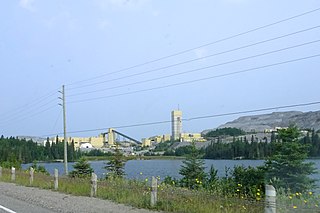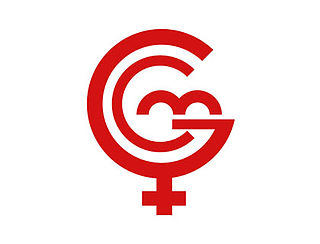
Mining is the extraction of valuable minerals or other geological materials from the Earth, usually from an ore body, lode, vein, seam, reef, or placer deposit. Exploitation of these deposits for raw material is based on the economic viability of investing in the equipment, labor, and energy required to extract, refine and transport the materials found at the mine to manufacturers who can use the material.

Barrick Gold Corporation is a mining company that produces gold and copper with 16 operating sites in 13 countries. It is headquartered in Toronto, Ontario, Canada. It has mining operations in Argentina, Canada, Chile, Côte d'Ivoire, Democratic Republic of the Congo, Dominican Republic, Mali, Papua New Guinea, Saudi Arabia, Tanzania, the United States and Zambia. In 2019, it produced 5.5 million ounces of gold at all-in sustaining costs of $894/ounce and 432 million pounds of copper at all-in sustaining costs of $2.52/pound. As of 31 December 2019, the company had 71 million ounces of proven and probable gold reserves.

Teck Resources Limited, known as Teck Cominco until late 2008, is a diversified natural resources company headquartered in Vancouver, British Columbia, that is engaged in mining and mineral development, including coal for the steelmaking industry, copper, zinc, and energy. Secondary products include lead, silver, gold, molybdenum, germanium, indium and cadmium. Teck Resources was formed from the amalgamation of Teck and Cominco in 2001.

La Générale des Carrières et des Mines (Gécamines) is a Congolese commodity trading and mining company headquartered in Lubumbashi, in the Katanga region of the Democratic Republic of Congo. It is a state-controlled corporation founded in 1966 and a successor to the Union Minière du Haut-Katanga. Gecamines is engaged in the exploration, research, exploitation and production of mineral deposits including copper and cobalt.

KGHM Polska Miedź S.A., commonly known as KGHM, is a Polish multinational corporation that employs around 34,000 people around the world and has been a major copper and silver producer for more than 50 years. In 1991, the company was established as a state enterprise and since 1997, their shares have been traded on the Warsaw Stock Exchange. Currently, KGHM operates 9 open-pit and underground mines located in Poland, Canada, the USA and Chile and is actively advancing 4 projects. KGHM produces key global resources including copper, copper sulphate, gold, silver, nickel, nickel sulphate, molybdenum, rhenium, lead, sulphuric acid, selenium, platinum group metals. KGHM is based in Lower Silesian Voivodeship in Lubin, Poland.

Pakistan Chrome Mines Ltd. is a mining company incorporated in the Islamic Republic of Pakistan. The company owns and operates Chromite and Magnesite mines in Balochistan Province. It was initially incorporated as Baluchistan Chrome Mines Ltd in 1902 during colonial rule.

Mining in Papua New Guinea is an important part of the Papua New Guinea economy.
China Minmetals Corporation is a Chinese metals and mineral trading company headquartered in Beijing. It is a state-owned corporation under direct supervision of the State-owned Assets Supervision and Administration Commission (SASAC). China Minmetals is engaged in the production and trading of metals and minerals, including copper, aluminum, tungsten, tin, antimony, lead, zinc, and nickel.

Mining in Afghanistan was controlled by the Ministry of Mines and Petroleum, prior to the August 15th takeover by the Taliban. It is headquartered in Kabul with regional offices in other parts of the country. Afghanistan has over 1,400 mineral fields, containing barite, chromite, coal, copper, gold, iron ore, lead, natural gas, petroleum, precious and semi-precious stones, salt, sulfur, lithium, talc, and zinc, among many other minerals. Gemstones include high-quality emerald, lapis lazuli, red garnet and ruby. According to a joint study by The Pentagon and the United States Geological Survey, Afghanistan has an estimated US$1 trillion of untapped minerals.

The mineral industry is one of the main sectors of the Armenian economy and in 2017 accounted for 30.1% of its exports.
The mineral industry of Russia is one of the world's leading mineral industries and accounts for a large percentage of the Commonwealth of Independent States' production of a range of mineral products, including metals, industrial minerals, and mineral fuels. In 2005, Russia ranked among the leading world producers or was a significant producer of a vast range of mineral commodities, including aluminum, arsenic, cement, copper, magnesium compounds and metals, nitrogen, palladium, silicon, nickel and vanadium.
Pakistan's industrial sector accounts for 28.11% of the GDP. Of this, manufacturing makes up 12.52%, mining constitutes 2.18%, construction makes up 2.05%, and electricity and gas 1.36%. The majority of industry is made up of textile units, with textiles contributing $15.4b to exports, making up 56% of total exports. Other units include surgical instruments, chemicals, and a budding automotive industry.
Mining is an important industry in Pakistan. Pakistan has deposits of several minerals including coal, copper, gold, chromite, mineral salt, bauxite and several other minerals. There are also a variety of precious and semi-precious minerals that are also mined. These include peridot, aquamarine, topaz, ruby, emerald, rare-earth minerals bastnaesite and xenotime, sphene, tourmaline, and many varieties and types of quartz.

Thompson Creek Metals Company Inc. was a full cycle mining company with acquisition, exploration, development, and operation in North America. The corporate office was located in Denver, Colorado. The company primarily produced copper, gold, and molybdenum. Over its history, the Company evolved from being a major primary molybdenum producer to becoming a copper and gold mining company with the construction and development of the Mount Milligan mine and concentrator in British Columbia, Canada. Mount Milligan was Thompson Creek Metals principal operation and the company owned 100% of this property. The company also owned 100% of its Thompson Creek Mine in Idaho. Thompson Creek Metals owned 75% joint venture interest in two other properties, including its Endako Mine in British Columbia, and its Langeloth Metallurgical Facility (roaster) in Pennsylvania. Thompson Creek Metals had additional development projects, including the Berg property in British Columbia.
The Reko Diq mine is a planned mining operation, located near Reko Diq town in Chagai District, Baluchistan, Pakistan. Reko Diq represents one of the largest copper and gold reserves in the world having estimated reserves of 5.9 billion tonnes of ore grading 0.41% copper and gold reserves amounting to 41.5 million oz.
The economy of Balochistan, one of the four provinces of Pakistan, is largely based upon the production of natural gas, coal, and minerals. Agriculture and livestock also dominate the Baloch economy. Horticultural development is a fairly recent, yet growing phenomenon. Other important economic sectors include fisheries, mining, manufacturing industries, trade and other services being rendered by public and private sector organizations in the province.

The Ministry of Petroleum and Natural Resources Divisionوزارت پیٹرولیم و قدرتی وسائل, wazarat-e- petroleum o qudrati wasail is a Pakistan Government's federal and executive level ministry responsible to ensure availability and security of sustainable supply of oil and gas for economic development and strategic requirements of Pakistan and to coordinate development of natural resources of energy and minerals.
Las Bambas copper mine is a large open-pit copper mine in Peru. The polymetallic mine is located at altitude of about 4000 meters above sea level in Challhuahuacho District of Cotabambas Province in the Apurímac Region of the southern Peruvian Andes. With over a billion tons of copper ore, the deposit is one of the largest in the world. With about 140,000 tons of copper ore are mined daily, the estimated mine life of at least 20 years. The mine produces 2% of global copper.
Metallurgical Corporation of China Limited is a listed company in Shanghai and Hong Kong stock exchanges. It is a subsidiary of China Metallurgical Group Corporation (MCC). In the past Baosteel Group was a minority shareholder.
The Reko Diq case, officially known as the "Tethyan Copper Company Pty Limited v. Islamic Republic of Pakistan" case is an ongoing legal case between the Government of Pakistan and the Tethyan Copper Company (TCC) over breach of the Australia–Pakistan Bilateral Investment Treaty (BIT) and illegal denial of mining rights to TCC at the Reko Diq Mine in Chagai District, Balochistan.














